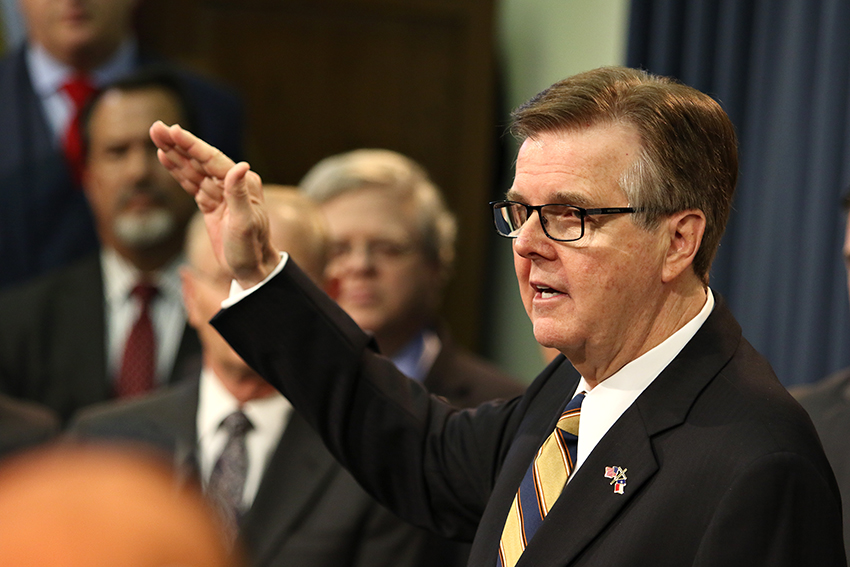Conventional wisdom has long intimated that the Texas governorship, compared to its companions in the other states, is a relatively weak position. The retort of the “Texas Monthly crowd” in both the years before my birth and of my infancy was that it was, in fact, the lieutenant governor who controlled the biggest sliver of power in the state. But perhaps the reality today is much more complex, with there being a lot of regional chieftains and no main emperor.
The old reasoning was rather straightforward. The lieutenant governor is a directly-elected position with almost despotic power over the State Senate. When the Legislature is in town, the so-called “Lite Guv” often has the most power of anyone in the Capitol. This was put on full display in the past with legends such as Bill Hobby and Bob Bullock occupying the position.
When I was just six years old, this appeared to change. Rick Perry became governor, and served an unprecedented more than 14 years in office. There are three main modest powers of the governor: to veto, to call special sessions and to unilaterally fill vacancies in many otherwise-elected executive positions. They were nimbly, aggressively used by Perry, who consolidated his power to an unheard level. State politics were dominated by him, and many issues rose and died on his caprices.
In 2015, when Greg Abbott succeeded Perry as governor, the aforementioned Texas Monthly crowd began to openly wonder if this new arrangement would continue, or if a regression toward normalcy would occur. After all, the lieutenant governor for almost all of Perry’s term, David Dewhurst, was as unprecedentedly weak as Perry was strong.
As this year’s session of the State Legislature has dragged on, some have found it easy to return to the pre-Perry era. Texas Monthly editorialized wildly in February about Lt. Gov. Dan Patrick, the bombastic Tea Party darling who defeated Dewhurst in the 2014 Republican primary. He was described on their cover as, simply, “In Charge.” And the primacy of his relevance over Abbott, who remains as silent as Paul Ryan’s conscience, this session is unchallenged.
But last Thursday, another contender arose and asported Patrick’s putative crown. In a biennial extravagance in which the State House considers hundreds of its amendments to the Senate’s budget, Patrick was dressed down repeatedly.
Patrick’s priorities this session have included a mean-spirited ban on so-called “sanctuary cities,” a North Carolina-style “bathroom bill” and the voucher-ization of the public school system. All passed the Senate by huge margins. All were dead on arrival in the House. The vouchers in particular were subject to a record vote in which they were humiliatingly defeated by a supermajority of the House.
The House, of course, is led by Speaker Joe Straus (R-San Antonio), who was first elected in 2009 by mostly Democrats and a gaggle of moderate Republicans, but has since earned the confidence of the rest of Republicans, sans a small but especially obstreperous group of rabble-rousers (Rep. Jonathan Stickland, R-Bedford, chief among them).
Patrick’s right-wing pet issues were one defeat, but on meat-and-potato type budget issues, Straus’s House also repudiated Patrick’s Senate. It passed a budget with fewer cuts and, more notably, a large deduction from the state’s Rainy Day Fund.
The biggest constant in all this is Abbott’s conspicuous absence. As Patrick and Straus go to war on a myriad of issues, it is easy to think that Abbott has ended the Perry era of gubernatorial primacy. But what has replaced it is something new entirely.
Since Straus was first elected, he has pledged that he would be a speaker for the members, not himself or for special interests. (The pledge was a jab at his predecessor, Rep. Tom Craddick, R-Midland, who was autocratic.) The speaker, elected to oversee his chamber, and not directly by voters like the lieutenant governor, is in a more nuanced position.
Thus as the session quickly reaches its expiration date, pundits and prognosticators might be quick to crown a new king: Straus, or the speakership and House more generally. But this too would be unwise. As the preceding should make abundantly clear, the reality is complex. In a state long dominated by abrasive, charismatic, louder-than-life personalities, perhaps this new reality of multi-polarity is a good thing.
Horwitz is a first-year law student from Houston. He is a senior columnist. Follow him on Twitter @NmHorwitz.





















